


Climate game on
Photos by Evan Krape and courtesy of UD’s Mangone Climate Change Science and Policy Hub April 11, 2024
UD hosts inaugural climate-themed video game jam
The subtle clicks of a computer mouse and the whir of desktop engines are the only sounds permeating the University of Delaware’s ESports Arena.
That hum is occasionally punctuated by the squeak of a chair or the tapping of fingers on a keyboard. You can almost hear a pin drop as dozens of students gaze at the screens in front of them.
Don’t mistake that quiet for idleness, though. Underneath the dim glow of the arena’s blue lights, these students are responding to rising sea levels, trekking through trash-filled waters and adventuring alongside mermaids. They’re also testing a new generation of video games created by their peers.
On March 8, participants, judges and video game enthusiasts convened in UD’s ESports Arena to celebrate its first game jam, a time-limited competition that challenges participants to create a video game from scratch.
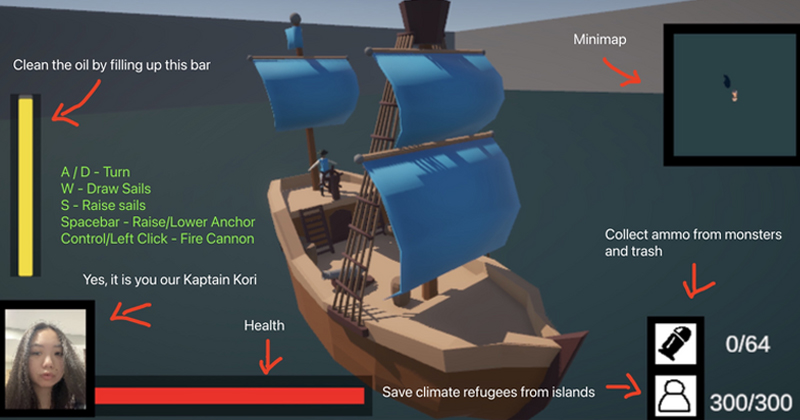
Contestants were challenged — as teams or individuals — to create an original video game that addressed the competition's three themes: oceans, women leaders and climate change. Participants representing five universities — UD, the University of California - Irvine, Ohio University, the University of Southern California and Irvine Valley College — competed in the event.
Eight games were submitted and ran the gamut in their design, gameplay and visual effects. They ranged from a game focused on sustainable fishing, an ocean pollution clean-up, pirates cleaning oil spills, a mermaid helping her sea creature friends and a professor collecting magical stones to address storms and sea level rise.
Four games included original artwork — both hand-drawn pixel art and 3-D models — and original sound effects and music. One had voice acting by the lead developer because the team “wanted to center her voice” in the game both figuratively and literally. The students behind the latter walked away victorious.
UD’s Kori Nguyen, Ziyi Zhou, Christopher Bennett, Tyran Rice Jr. and Michael Bocelli were the masterminds behind Climate Chantey, which won first place in the women leaders category.
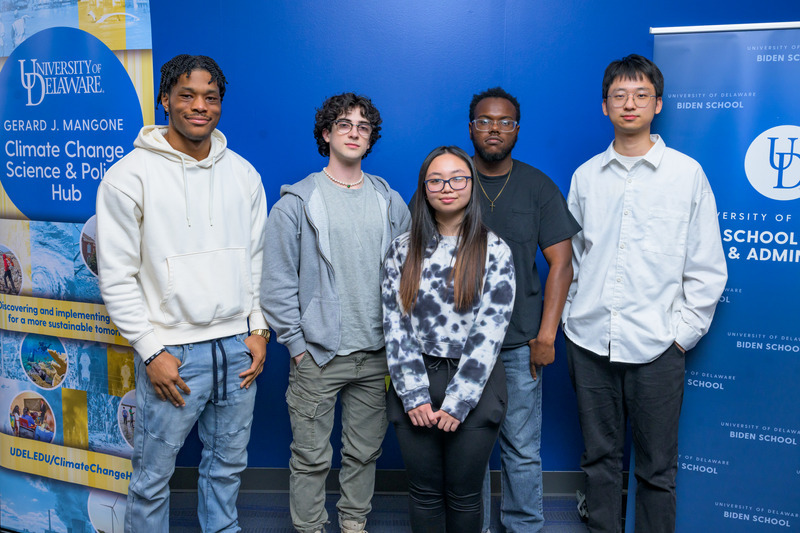
Their submission challenges players to sail the seven seas alongside Kaptain Kori to save climate refugees who have been displaced by coastal retreat, a growing coastal hazard that occurs when ocean waters encroach further inland. While the premise of this game touches on serious issues, the team behind it created this energetic, action-packed adventure video game in hopes that it could shed light on such heavy topics and inspire people to take action.
“We thought a female pirate would be an interesting idea to push,” said Nguyen, the protagonist’s namesake and a junior visual communications major. “We didn’t want to address female leadership and then have people forget. We wanted it front and center in our game.”
Eric Patrick, a dual game design and computer science major at the University of California’s Irvine campus, won best game overall for his submission, Professor Maren and The Aqueous Stones. A game designed by a team of two students from the University of Southern California and Irvine Valley College called Fish ‘n Clicks placed first in the final category, the "most transformative game,” or the game with the clearest message and potential to inspire players to take action on an environmental issue.
Why video games?
A.R. Siders, director of the Mangone Climate Change Science and Policy Hub and core faculty in the Disaster Research Center at UD, came up with the idea of a climate-themed game jam. As a self-proclaimed “climate geek” and long-time gamer, the idea for such an event was a natural way to marry two of her passions while actively engaging UD’s student body in addressing environmental issues.
“The Jam is a great opportunity to bring people together from totally different perspectives who are all excited about the connections across these themes,” Siders said. “Facts and charts don’t move people. They don’t inspire action or instigate change, but video games can change how people think about climate change.”
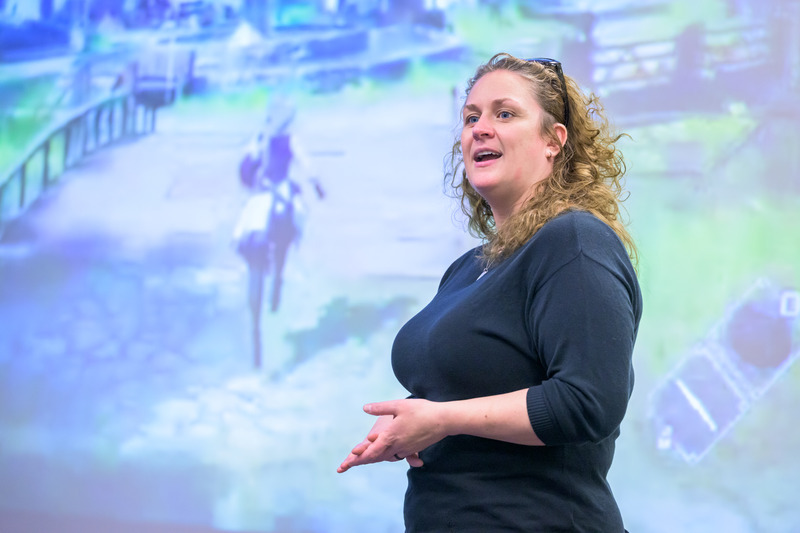
Many video games have climate themes, even if they are not explicit. Games also have incredible reach: the United Nations Playing for the Planet Alliance, which supports game industry efforts to reduce their environmental impact, estimates that more than 3 billion people play video or computer games.
While larger game jams — like the UN’s Green Game Jam — are an opportunity for established game developers to add environmental content to their games, this event specifically supported students and amateur developers. It focused on building design skills and raising awareness about how games can be tools for climate change communication, education and advocacy.
“Video games are more than entertainment and leisure,” said Phill Penix-Tadsen, co-founder of UD's academic program in game studies and eSports and one of the event's judges. “Developers are seeing how they can have a social impact. We’re really thinking about how they can change the world.”
Video games are powerful educational tools and an engaging way of exploring complex and systemic problems. They also give players a unique opportunity to step into different roles and confront serious issues like climate change. This kind of engagement has an emotional impact on players that other mediums cannot accomplish.
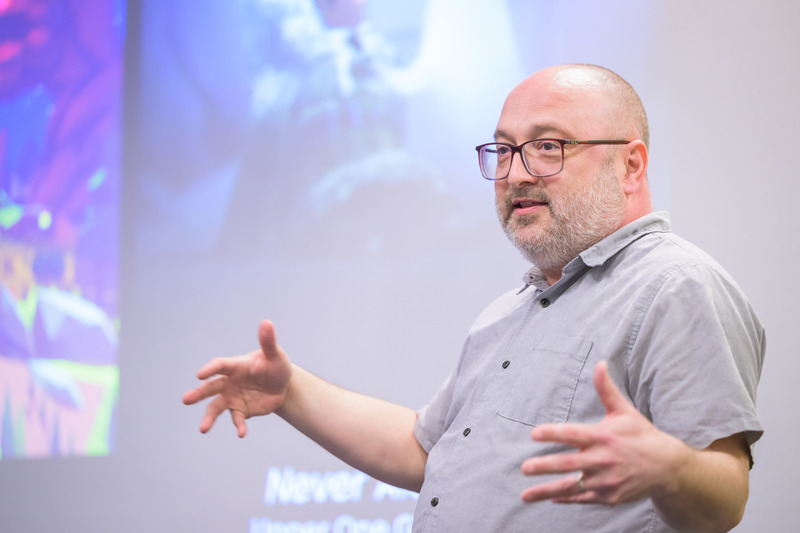
Game on
While participants had two weeks to develop their games, months of preparation went into organizing the event. Students had the opportunity to attend webinars hosted by experts from a variety of disciplines, such as e-sports management, ecocriticism, oceanography and marine science, to learn about the social impact of environmental games and how to design those games purposefully.
One of the issues highlighted during webinars and throughout the competition was the need for integration in game development. Too often, Siders said, the various fields involved in game development are siloed, even though integrating those various perspectives is critical in creating video games that address climate change.
This emphasis on integration inspired participants to take an interdisciplinary, collaborative approach, as was the case for UD’s winning team.
“This was the first game jam that I've ever really participated in, and I do appreciate having my team members helping me and kind of talking me through it, “ Nguyen said. “These guys have done a game jam before because they're computer science majors, but I’m art based.”
The participants brought their own talents to the table.
“These guys really put in the work,” said Bennett, a senior computer science major. “Mikey worked on the different waves, Teran worked on all the different menus, and Kori did all the voice work and the models. Ziyi was new, but we taught him all we know.”

The team estimated that they spent more than 40 hours in the library working on Climate Chantey, submitting it just two minutes before the competition closed. One of the last features added was the voiceover. In homage to the game jam’s women leadership theme, team members wanted to elevate the voice of the game’s main character, Kaptain Kori, both literally and figuratively through voice acting. Team members said the goal was to emphasize the protagonist’s narrative and make the atmosphere more immersive.
“I know a lot of people cringe at hearing their own voice, but it was very funny writing the lines in the group chat and then saying them out loud,” Rice said.
This touch is what judges say gave their project a competitive edge.
“It’s hard to make happy climate games, and I think humor can be an effective way to get a serious message across,” Penix-Tadsen said. “It was a real strength of theirs, and the joy of their creative process really shows.”
More than a dozen judges, including climate scientists, game developers, writers and specialists in game art and music, evaluated the games. Submissions were scored based on their design, potential to inspire change, communicate science to an audience, gameplay, and relevance to the competition’s themes. Judges also awarded honorable mentions for special efforts, like creating original art or music for the event or collaborating with climate and ocean scientists.
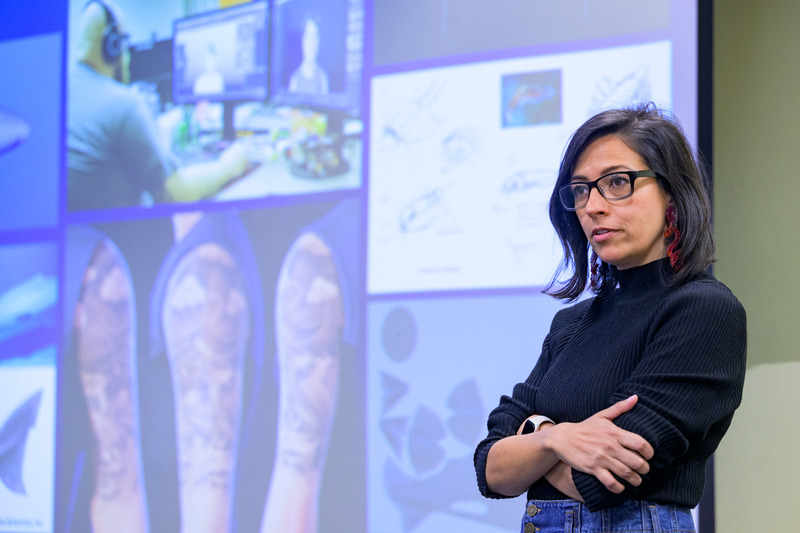
Submitted games were showcased to the public, allowing people to play and comment on them. Guests also heard from Carolina Torres, the game jam’s keynote speaker and impact producer at E-Line Media.
“Video games really allow players to put themselves into someone else's shoes and fail safely,” said Torres, who has experience producing social impact games in a wide range of settings, including climate change and oceans. “It really is something that you embody as opposed to a movie or a book, which can be a little bit more passive.”
Siders also hopes that the game jam helps put UD on the map as a place that does cross-disciplinary climate work.
“We have excellent expertise in game design, climatology, engineering, ocean science, and environmental humanities,” Siders said. “But our real strength is our ability to put those together creatively.”
Contact Us
Have a UDaily story idea?
Contact us at ocm@udel.edu
Members of the press
Contact us at 302-831-NEWS or visit the Media Relations website

